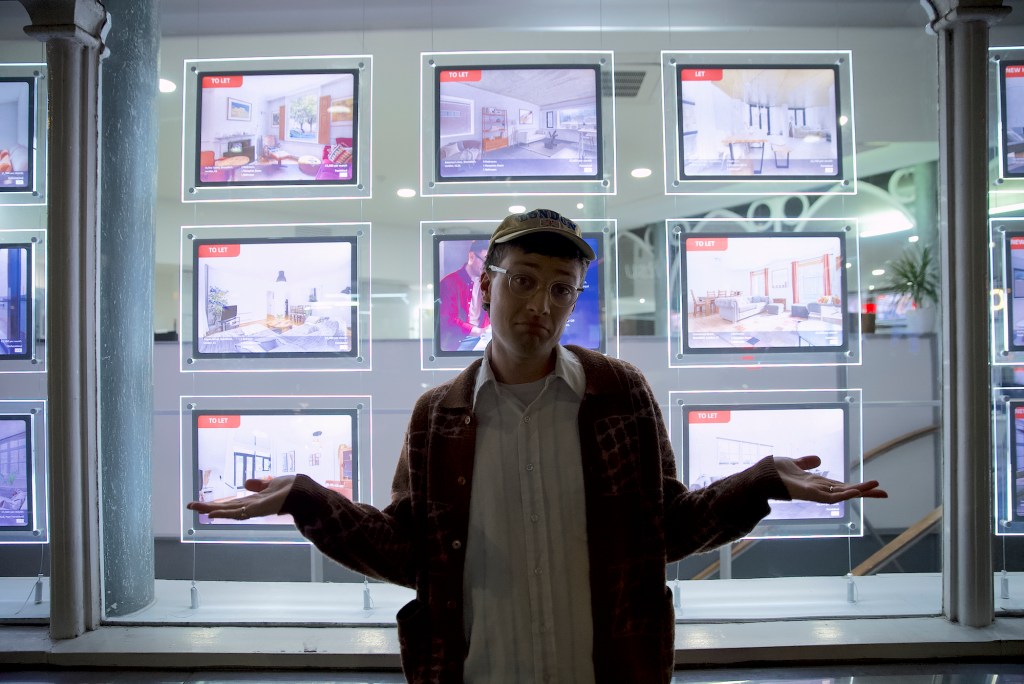
Still via ‘Daddy Daycare,’ via IMDB/Revolution Studios
For most of the year, my partner and I split the duties of caring for our two-year-old daughter 50/50. But at least once during the year, when my partner’s work schedule becomes more demanding, I step in as our daughter’s sole caretaker. We spend this time together at the park, in the aisles of toy stores, in the waiting room for the pediatrician.
In the past two decades or so, the number of stay-at-home dads has risen—from just over 1 million in 1989 to 2 million in 2012, according to the Pew Research Center. We’ve also become more visible in society, from the cover of the New Yorker to the butt of every joke in movies and TV shows like Guys with Kids or Daddy Day Care.
Videos by VICE
You might think there’s a certain comfort in knowing we’re not the only ones bouncing babies on our knees and reading children’s books all day, but no. The reality of being a stay-at-home dad is that strangers are suspicious, our friends are patronizing, and stay-at-home moms—the one group you might actually expect to have your back—often won’t let you into their club.
Bradley Egel, who has been a stay-at-home dad for the last decade, told me when he first started taking his son to the park, he felt ostracized by the other moms.
“There was this group of moms who were extraordinarily cold to me. Sometimes to the point where they would just leave [when I arrived],” he said. “Then, after a year, this one woman—I guess she was like queen bee—walks over and says, ‘We’ve been noticing that you come to the same park all the time. What’s your deal?’ I was like, ‘I’m here with my kid. The same as you.’”
Those kinds of negative reactions take a toll. James Kline, a board member of the National At-Home Dad Network, told VICE social prejudice and isolation are among the top causes of depression among full-time dads.
“Even though great progress has been made toward acceptance, the idea of the inept father is still being reinforced through media and the general public,” said Kline, a father of three from Raleigh, North Carolina, who sought treatment for depression and anxiety after the birth of his second child. Now, as part of the National At-Home Dad Network, he provides support to other stay-at-home dads in similar positions.
Depression issues can be exacerbated, he said, because men don’t always ask for help. “We tend to internalize it and have the DIY attitude.”
“We’ve been noticing that you come to the same park all the time. What’s your deal?”
Of course, plenty of new parents struggle with depression—whether they’re moms or dads, stay-at-home or not. A UK study published last month showed 3.6 percent of men had depression in the first year of fatherhood and another survey showed one in three new dads were worried about their mental health.
But stay-at-home dads aren’t just struggling to adjust to the demands of parenthood; we’re also acknowledging that we aren’t the breadwinners in our households, and that can hurt. I’d like to think we’re more enlightened than needing our own paycheck to prove our masculinity, but financial dependency does have a correlation with depression in men. A 2013 Danish study, for example, found that financially dependent men were more likely to seek treatment for anxiety, insomnia, and erectile dysfunction. Their explanation? Social norms made these men feel inadequate.
“I have friends tease me about being financially dependent,” said Mark Suguitan, an LA-based full-time dad-of-two, whose wife works as a naval dentist. “They’ll ask, ‘What’s your allowance?’ So I say to them, ‘Well, how much do you think childcare costs? Because that’s what I’m getting paid.’”
Another study from Cornell University found that men who earn less than their spouses were more likely to be unfaithful, which the study’s authors saw as a way to counter the threat to their manhood posed by the wage deficit. (These studies focused on men in heterosexual relationships; the dynamic could be different for financially dependent men and stay-at-home dads who are in same-sex relationships.)
“No one wants to have to ask permission to buy something, but that can be even more true for a man, especially if the man had spent time earning his own money,” Peggy Drexler, a psychology professor at Weill Cornell Medical College, told VICE. That goes for women, too—as Drexler put it, “few people like to feel dependent, even in a marriage”—but the taboo against financial dependence is much greater for men.
According to Drexler, the way men respond to this perceived threat to their manhood depends on how the couple came to the decision that he should remain at home, “and whether it was a choice or an inevitability.” A man who becomes a stay-at-home dad because he lost his job, for example, might react more negatively than a man who consciously left the workforce to focus on parenting.
Plus, not all stay-at-home dads are unemployed. Ian Kerner, a New York-based psychologist and sexologist, told me most of the stay-at-home dads he sees in couples therapy have freelance jobs or work that doesn’t require them to go into an office. Compared to office-bound dads, Kerner said the at-home dads are “usually more invested in making the relationship work, in part because they have more to lose financially if it fails.” In other words, there’s more on the line—which can either be motivating or depressing.
Egel, who was bullied at the park by the stay-at-home moms, told me he loves being a full-time dad. But he also recognizes what it’s cost him, both in his career and his personal life.
“I’ve sacrificed ten years where I’ve not been able to do a lot of things,” he said. “But this was more important. I don’t care if they’re the best-looking kids or the smartest kids. I just want them to be decent human beings that treat people right. That’s all that matters to me. That’s my job.”
Follow Paul Willis on Twitter.
More
From VICE
-

Screenshot: ConcernedApe -

The author lurks outside an estate agents, Voigt-Kampff machine just out of shot. Photo by Zuka George -

Jesus, Mary Magdalene, Judas Iscariot, and some fourth wheel at the Last Supper (All photos by Paige Taylor White) -

Photo by Christian Filardo